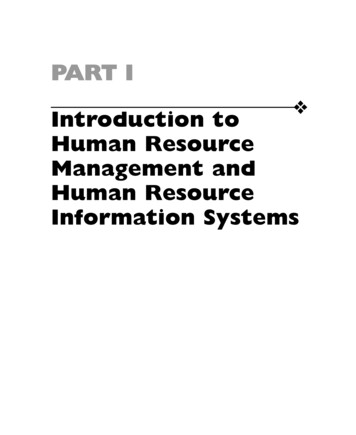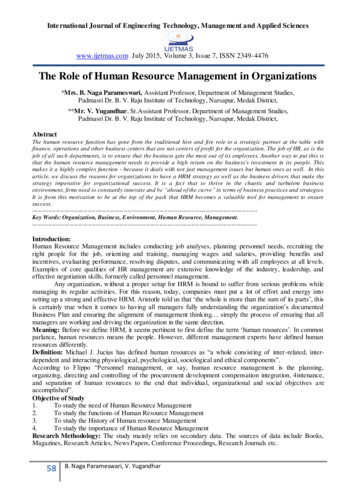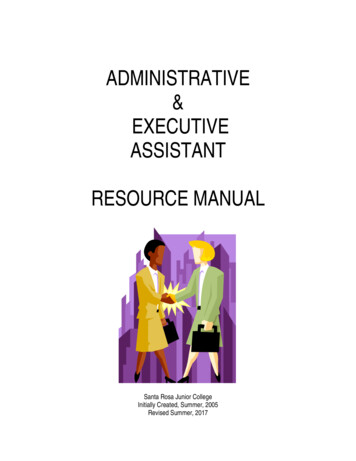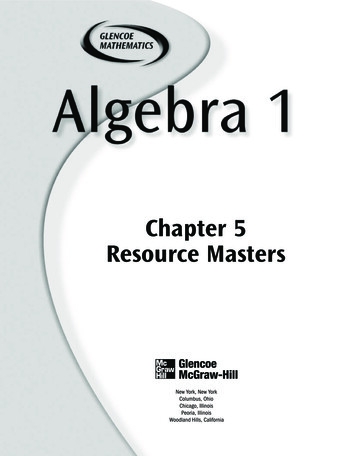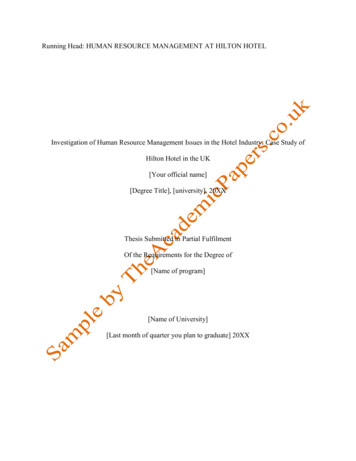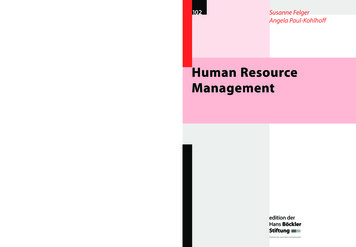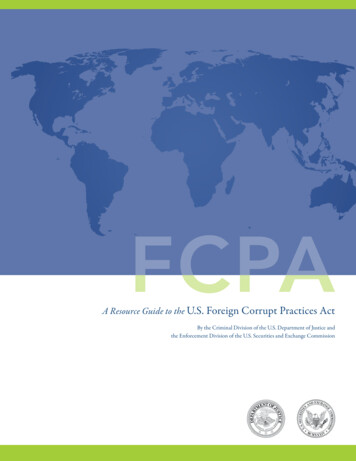
Transcription
chapter 1IntroductionFCPAA Resource Guide to the U.S. Foreign Corrupt Practices ActBy the Criminal Division of the U.S. Department of Justice andthe Enforcement Division of the U.S. Securities and Exchange Commission
This guide is intended to provide information for businesses and individuals regarding the U.S. Foreign Corrupt PracticesAct (FCPA). The guide has been prepared by the staff of the Criminal Division of the U.S. Department of Justice and theEnforcement Division of the U.S. Securities and Exchange Commission. It is non-binding, informal, and summary in nature, andthe information contained herein does not constitute rules or regulations. As such, it is not intended to, does not, and may notbe relied upon to create any rights, substantive or procedural, that are enforceable at law by any party, in any criminal, civil, oradministrative matter. It is not intended to substitute for the advice of legal counsel on specific issues related to the FCPA. It doesnot in any way limit the enforcement intentions or litigating positions of the U.S. Department of Justice, the U.S. Securities andExchange Commission, or any other U.S. government agency.Companies or individuals seeking an opinion concerning specific prospective conduct are encouraged to use the U.S.Department of Justice’s opinion procedure discussed in Chapter 9 of this guide.This guide is United States Government property. It is available to the public free of charge online at www.justice.gov/criminal/fraud/fcpa and www.sec.gov/spotlight/fcpa.shtml.
A RESOURCE GUIDE TO THEU.S. FOREIGN CORRUPT PRACTICES ACTBy the Criminal Division of the U.S. Department of Justice andthe Enforcement Division of the U.S. Securities and Exchange Commission
FOREWORDWe are pleased to announce the publication of A Resource Guide to the U.S. Foreign Corrupt Practices Act. The ForeignCorrupt Practices Act (FCPA) is a critically important statute for combating corruption around the globe. Corruption hascorrosive effects on democratic institutions, undermining public accountability and diverting public resources from important priorities such as health, education, and infrastructure. When business is won or lost based on how much a company iswilling to pay in bribes rather than on the quality of its products and services, law-abiding companies are placed at a competitive disadvantage—and consumers lose. For these and other reasons, enforcing the FCPA is a continuing priority at theDepartment of Justice (DOJ) and the Securities and Exchange Commission (SEC).The Guide is the product of extensive efforts by experts at DOJ and SEC, and has benefited from valuable input fromthe Departments of Commerce and State. It endeavors to provide helpful information to enterprises of all shapes and sizes—from small businesses doing their first transactions abroad to multi-national corporations with subsidiaries around the world.The Guide addresses a wide variety of topics, including who and what is covered by the FCPA’s anti-bribery and accountingprovisions; the definition of a “foreign official”; what constitute proper and improper gifts, travel and entertainment expenses;the nature of facilitating payments; how successor liability applies in the mergers and acquisitions context; the hallmarks ofan effective corporate compliance program; and the different types of civil and criminal resolutions available in the FCPAcontext. On these and other topics, the Guide takes a multi-faceted approach, setting forth in detail the statutory requirements while also providing insight into DOJ and SEC enforcement practices through hypotheticals, examples of enforcement actions and anonymized declinations, and summaries of applicable case law and DOJ opinion releases.The Guide is an unprecedented undertaking by DOJ and SEC to provide the public with detailed information aboutour FCPA enforcement approach and priorities. We are proud of the many lawyers and staff who worked on this project,and hope that it will be a useful reference for companies, individuals, and others interested in our enforcement of the Act.Lanny A. BreuerAssistant Attorney GeneralCriminal DivisionDepartment of JusticeRobert S. KhuzamiDirector of EnforcementSecurities and Exchange CommissionNovember 14, 2012
CONTENTSChapter 1: INTRODUCTION . . . . . . . . . . . . . . . . . . . . . . . . . . . . . . . . . . 2The Costs of Corruption . . . . . . . . . . . . . . . . . . . . . . . . . . . . . . . . . . . . . . . . . . . . . . . . . . . . . 2Historical Background . . . . . . . . . . . . . . . . . . . . . . . . . . . . . . . . . . . . . . . . . . . . . . . . . . . . . . 3National Landscape: Interagency Efforts . . . . . . . . . . . . . . . . . . . . . . . . . . . . . . . . . . . . . . . . . . . 4Department of Justice . . . . . . . . . . . . . . . . . . . . . . . . . . . . . . . . . . . . . . . . . . . . . . . . . . . . 4Securities and Exchange Commission . . . . . . . . . . . . . . . . . . . . . . . . . . . . . . . . . . . . . . . . . . . . 4Law Enforcement Partners . . . . . . . . . . . . . . . . . . . . . . . . . . . . . . . . . . . . . . . . . . . . . . . . . . 5Departments of Commerce and State . . . . . . . . . . . . . . . . . . . . . . . . . . . . . . . . . . . . . . . . . . . . 5International Landscape: Global Anti-Corruption Efforts . . . . . . . . . . . . . . . . . . . . . . . . . . . . . . . . . . 7OECD Working Group on Bribery and the Anti-Bribery Convention . . . . . . . . . . . . . . . . . . . . . . . . . . . .7U.N. Convention Against Corruption . . . . . . . . . . . . . . . . . . . . . . . . . . . . . . . . . . . . . . . . . . . .8Other Anti-Corruption Conventions . . . . . . . . . . . . . . . . . . . . . . . . . . . . . . . . . . . . . . . . . . . . . 8Chapter 2: THE FCPA: ANTI-BRIBERY PROVISIONS . . . . . . . . . . . . . . . . . . . . . 10Who Is Covered by the Anti-Bribery Provisions? . . . . . . . . . . . . . . . . . . . . . . . . . . . . . . . . . . . . . . 10Issuers—15 U.S.C. § 78dd-1 . . . . . . . . . . . . . . . . . . . . . . . . . . . . . . . . . . . . . . . . . . . . . . . . 10Domestic Concerns—15 U.S.C. § 78dd-2 . . . . . . . . . . . . . . . . . . . . . . . . . . . . . . . . . . . . . . . . . 11Territorial Jurisdiction—15 U.S.C. § 78dd-3 . . . . . . . . . . . . . . . . . . . . . . . . . . . . . . . . . . . . . . . . 11What Jurisdictional Conduct Triggers the Anti-Bribery Provisions? . . . . . . . . . . . . . . . . . . . . . . . . . . . 11What Is Covered?—The Business Purpose Test . . . . . . . . . . . . . . . . . . . . . . . . . . . . . . . . . . . . . . . 12What Does “Corruptly” Mean? . . . . . . . . . . . . . . . . . . . . . . . . . . . . . . . . . . . . . . . . . . . . . . . . 14What Does “Willfully” Mean and When Does It Apply? . . . . . . . . . . . . . . . . . . . . . . . . . . . . . . . . . . 14What Does “Anything of Value” Mean? . . . . . . . . . . . . . . . . . . . . . . . . . . . . . . . . . . . . . . . . . . . 14Cash . . . . . . . . . . . . . . . . . . . . . . . . . . . . . . . . . . . . . . . . . . . . . . . . . . . . . . . . . . . . . 15Gifts, Travel, Entertainment, and Other Things of Value . . . . . . . . . . . . . . . . . . . . . . . . . . . . . . . . . . 15Charitable Contributions . . . . . . . . . . . . . . . . . . . . . . . . . . . . . . . . . . . . . . . . . . . . . . . . . . 16Who Is a Foreign Official? . . . . . . . . . . . . . . . . . . . . . . . . . . . . . . . . . . . . . . . . . . . . . . . . . . . 19Department, Agency, or Instrumentality of a Foreign Government . . . . . . . . . . . . . . . . . . . . . . . . . . . . 20Public International Organizations . . . . . . . . . . . . . . . . . . . . . . . . . . . . . . . . . . . . . . . . . . . . . 21How Are Payments to Third Parties Treated? . . . . . . . . . . . . . . . . . . . . . . . . . . . . . . . . . . . . . . . . 21What Affirmative Defenses Are Available? . . . . . . . . . . . . . . . . . . . . . . . . . . . . . . . . . . . . . . . . . . 23The Local Law Defense . . . . . . . . . . . . . . . . . . . . . . . . . . . . . . . . . . . . . . . . . . . . . . . . . . . 23Reasonable and Bona Fide Expenditures . . . . . . . . . . . . . . . . . . . . . . . . . . . . . . . . . . . . . . . . . . 24What Are Facilitating or Expediting Payments? . . . . . . . . . . . . . . . . . . . . . . . . . . . . . . . . . . . . . . . 25Does the FCPA Apply to Cases of Extortion or Duress? . . . . . . . . . . . . . . . . . . . . . . . . . . . . . . . . . . 27Principles of Corporate Liability for Anti-Bribery Violations . . . . . . . . . . . . . . . . . . . . . . . . . . . . . . . . 27Parent-Subsidiary Liability . . . . . . . . . . . . . . . . . . . . . . . . . . . . . . . . . . . . . . . . . . . . . . . . . . 27Successor Liability . . . . . . . . . . . . . . . . . . . . . . . . . . . . . . . . . . . . . . . . . . . . . . . . . . . . . . 28Additional Principles of Criminal Liability for Anti-Bribery Violations: Aiding and Abetting and Conspiracy . . . . 34
Additional Principles of Civil Liability for Anti-Bribery Violations: Aiding and Abetting and Causing . . . . . . . . 34What Is the Applicable Statute of Limitations? . . . . . . . . . . . . . . . . . . . . . . . . . . . . . . . . . . . . . . . 34Statute of Limitations in Criminal Cases . . . . . . . . . . . . . . . . . . . . . . . . . . . . . . . . . . . . . . . . . . 34Statute of Limitations in Civil Actions . . . . . . . . . . . . . . . . . . . . . . . . . . . . . . . . . . . . . . . . . . . . 35Chapter 3: THE FCPA: ACCOUNTING PROVISIONS . . . . . . . . . . . . . . . . . . . . 38What Is Covered by the Accounting Provisions? . . . . . . . . . . . . . . . . . . . . . . . . . . . . . . . . . . . . . . 39Books and Records Provision . . . . . . . . . . . . . . . . . . . . . . . . . . . . . . . . . . . . . . . . . . . . . . . . 39Internal Controls Provision . . . . . . . . . . . . . . . . . . . . . . . . . . . . . . . . . . . . . . . . . . . . . . . . . 40Potential Reporting and Anti-Fraud Violations . . . . . . . . . . . . . . . . . . . . . . . . . . . . . . . . . . . . . . . 41What Are Management’s Other Obligations? . . . . . . . . . . . . . . . . . . . . . . . . . . . . . . . . . . . . . . . 42Who Is Covered by the Accounting Provisions? . . . . . . . . . . . . . . . . . . . . . . . . . . . . . . . . . . . . . . . 42Civil Liability for Issuers, Subsidiaries, and Affiliates . . . . . . . . . . . . . . . . . . . . . . . . . . . . . . . . . . . . 42Civil Liability for Individuals and Other Entities . . . . . . . . . . . . . . . . . . . . . . . . . . . . . . . . . . . . . . . 43Criminal Liability for Accounting Violations . . . . . . . . . . . . . . . . . . . . . . . . . . . . . . . . . . . . . . . . . 44Conspiracy and Aiding and Abetting Liability . . . . . . . . . . . . . . . . . . . . . . . . . . . . . . . . . . . . . . . 45Auditor Obligations . . . . . . . . . . . . . . . . . . . . . . . . . . . . . . . . . . . . . . . . . . . . . . . . . . . . . . . 45Chapter 4: OTHER RELATED U.S. LAWS . . . . . . . . . . . . . . . . . . . . . . . . . . . 48Travel Act . . . . . . . . . . . . . . . . . . . . . . . . . . . . . . . . . . . . . . . . . . . . . . . . . . . . . . . . . . . . . 48Money Laundering . . . . . . . . . . . . . . . . . . . . . . . . . . . . . . . . . . . . . . . . . . . . . . . . . . . . . . . 48Mail and Wire Fraud . . . . . . . . . . . . . . . . . . . . . . . . . . . . . . . . . . . . . . . . . . . . . . . . . . . . . . . 49Certification and Reporting Violations . . . . . . . . . . . . . . . . . . . . . . . . . . . . . . . . . . . . . . . . . . . . 49Tax Violations . . . . . . . . . . . . . . . . . . . . . . . . . . . . . . . . . . . . . . . . . . . . . . . . . . . . . . . . . . . 49Chapter 5: GUIDING PRINCIPLES OF ENFORCEMENT . . . . . . . . . . . . . . . . . . . 52What Does DOJ Consider When Deciding Whether to Open an Investigation or Bring Charges? . . . . . . . . . 52DOJ Principles of Federal Prosecution . . . . . . . . . . . . . . . . . . . . . . . . . . . . . . . . . . . . . . . . . . . 52DOJ Principles of Federal Prosecution of Business Organizations . . . . . . . . . . . . . . . . . . . . . . . . . . . . . 52What Does SEC Consider When Deciding Whether to Open an Investigation or Bring Charges? . . . . . . . . . 53Self-Reporting, Cooperation, and Remedial Efforts . . . . . . . . . . . . . . . . . . . . . . . . . . . . . . . . . . . . 54Criminal Cases . . . . . . . . . . . . . . . . . . . . . . . . . . . . . . . . . . . . . . . . . . . . . . . . . . . . . . . 54Civil Cases . . . . . . . . . . . . . . . . . . . . . . . . . . . . . . . . . . . . . . . . . . . . . . . . . . . . . . . . . . 55Corporate Compliance Program . . . . . . . . . . . . . . . . . . . . . . . . . . . . . . . . . . . . . . . . . . . . . . . 56Hallmarks of Effective Compliance Programs . . . . . . . . . . . . . . . . . . . . . . . . . . . . . . . . . . . . . . . . 57Commitment from Senior Management and a Clearly Articulated Policy Against Corruption . . . . . . . . . . . . . . 57Code of Conduct and Compliance Policies and Procedures . . . . . . . . . . . . . . . . . . . . . . . . . . . . . . . . 57Oversight, Autonomy, and Resources . . . . . . . . . . . . . . . . . . . . . . . . . . . . . . . . . . . . . . . . . . . 58Risk Assessment . . . . . . . . . . . . . . . . . . . . . . . . . . . . . . . . . . . . . . . . . . . . . . . . . . . . . . . 58Training and Continuing Advice . . . . . . . . . . . . . . . . . . . . . . . . . . . . . . . . . . . . . . . . . . . . . . 59Incentives and Disciplinary Measures . . . . . . . . . . . . . . . . . . . . . . . . . . . . . . . . . . . . . . . . . . . . 59Third-Party Due Diligence and Payments . . . . . . . . . . . . . . . . . . . . . . . . . . . . . . . . . . . . . . . . . . 60
Confidential Reporting and Internal Investigation . . . . . . . . . . . . . . . . . . . . . . . . . . . . . . . . . . . . . 61Continuous Improvement: Periodic Testing and Review . . . . . . . . . . . . . . . . . . . . . . . . . . . . . . . . . . 61Mergers and Acquisitions: Pre-Acquisition Due Diligence and Post-Acquisition Integration . . . . . . . . . . . . . . . 62Other Guidance on Compliance and International Best Practices . . . . . . . . . . . . . . . . . . . . . . . . . . . . 63Chapter 6: FCPA PENALTIES, SANCTIONS, AND REMEDIES . . . . . . . . . . . . . . . . 68What Are the Potential Consequences for Violations of the FCPA? . . . . . . . . . . . . . . . . . . . . . . . . . . . 68Criminal Penalties . . . . . . . . . . . . . . . . . . . . . . . . . . . . . . . . . . . . . . . . . . . . . . . . . . . . . . . . 68U.S. Sentencing Guidelines . . . . . . . . . . . . . . . . . . . . . . . . . . . . . . . . . . . . . . . . . . . . . . . . . 68Civil Penalties . . . . . . . . . . . . . . . . . . . . . . . . . . . . . . . . . . . . . . . . . . . . . . . . . . . . . . . . . . 69Collateral Consequences . . . . . . . . . . . . . . . . . . . . . . . . . . . . . . . . . . . . . . . . . . . . . . . . . . . . 69Debarment . . . . . . . . . . . . . . . . . . . . . . . . . . . . . . . . . . . . . . . . . . . . . . . . . . . . . . . . . 70Cross-Debarment by Multilateral Development Banks . . . . . . . . . . . . . . . . . . . . . . . . . . . . . . . . . . . 70Loss of Export Privileges . . . . . . . . . . . . . . . . . . . . . . . . . . . . . . . . . . . . . . . . . . . . . . . . . . 71When Is a Compliance Monitor or Independent Consultant Appropriate? . . . . . . . . . . . . . . . . . . . . . . . 71Chapter 7: RESOLUTIONS . . . . . . . . . . . . . . . . . . . . . . . . . . . . . . . . . . 74What Are the Different Types of Resolutions with DOJ? . . . . . . . . . . . . . . . . . . . . . . . . . . . . . . . . . . 74Criminal Complaints, Informations, and Indictments . . . . . . . . . . . . . . . . . . . . . . . . . . . . . . . . . . . . 74Plea Agreements . . . . . . . . . . . . . . . . . . . . . . . . . . . . . . . . . . . . . . . . . . . . . . . . . . . . . . 74Deferred Prosecution Agreements . . . . . . . . . . . . . . . . . . . . . . . . . . . . . . . . . . . . . . . . . . . . . 74Non-Prosecution Agreements . . . . . . . . . . . . . . . . . . . . . . . . . . . . . . . . . . . . . . . . . . . . . . . 75Declinations . . . . . . . . . . . . . . . . . . . . . . . . . . . . . . . . . . . . . . . . . . . . . . . . . . . . . . . . . 75What Are the Different Types of Resolutions with SEC? . . . . . . . . . . . . . . . . . . . . . . . . . . . . . . . . . . 76Civil Injunctive Actions and Remedies . . . . . . . . . . . . . . . . . . . . . . . . . . . . . . . . . . . . . . . . . . . 76Civil Administrative Actions and Remedies . . . . . . . . . . . . . . . . . . . . . . . . . . . . . . . . . . . . . . . . . 76Deferred Prosecution Agreements . . . . . . . . . . . . . . . . . . . . . . . . . . . . . . . . . . . . . . . . . . . . . 76Non-Prosecution Agreements . . . . . . . . . . . . . . . . . . . . . . . . . . . . . . . . . . . . . . . . . . . . . . . 77Termination Letters and Declinations . . . . . . . . . . . . . . . . . . . . . . . . . . . . . . . . . . . . . . . . . . . . 77What Are Some Examples of Past Declinations by DOJ and SEC? . . . . . . . . . . . . . . . . . . . . . . . . . . . . 77Chapter 8: WHISTLEBLOWER PROVISIONS AND PROTECTIONS . . . . . . . . . . . . . 82Chapter 9: DOJ OPINION PROCEDURE . . . . . . . . . . . . . . . . . . . . . . . . . . . 86Chapter 10: CONCLUSION . . . . . . . . . . . . . . . . . . . . . . . . . . . . . . . . . . 90APPENDIX: THE FOREIGN CORRUPT PRACTICES ACT . . . . . . . . . . . . . . . . . . . 92APPENDIX: ENDNOTES . . . . . . . . . . . . . . . . . . . . . . . . . . . . . . . . . . 104
Corporate bribery is bad business. In our free market system it is basic that thesale of products should take place on the basis of price, quality, and service.Corporate bribery is fundamentally destructive of this basic tenet. Corporatebribery of foreign officials takes place primarily to assist corporations in gainingbusiness. Thus foreign corporate bribery affects the very stability of overseasbusiness. Foreign corporate bribes also affect our domestic competitive climatewhen domestic firms engage in such practices as a substitute for healthy competition for foreign business.1—United States Senate, 1977
chapter 1IntroductionINTRODUCTIONCongress enacted the U.S. Foreign Corrupt Practices Act (FCPA or the Act) in1977 in response to revelations of widespread bribery of foreign officials by U.S.companies. The Act was intended to halt those corrupt practices, create a levelplaying field for honest businesses, and restore public confidence in the integrity of the marketplace.2The FCPA contains both anti-bribery and accountingenforcement authority and are committed to fighting for-provisions. The anti-bribery provisions prohibit U.S. per-eign bribery through robust enforcement. An importantsons and businesses (domestic concerns), U.S. and foreigncomponent of this effort is education, and this resourcepublic companies listed on stock exchanges in the Unitedguide, prepared by DOJ and SEC staff, aims to provideStates or which are required to file periodic reports withbusinesses and individuals with information to help themthe Securities and Exchange Commission (issuers), andabide by the law, detect and prevent FCPA violations, andcertain foreign persons and businesses acting while in theimplement effective compliance programs.territory of the United States (territorial jurisdiction) frommaking corrupt payments to foreign officials to obtain orThe Costs of Corruptionretain business. The accounting provisions require issuersCorruption is a global problem. In the three decadesto make and keep accurate books and records and to devisesince Congress enacted the FCPA, the extent of corporateand maintain an adequate system of internal accountingbribery has become clearer and its ramifications in a trans-controls. The accounting provisions also prohibit individu-national economy starker. Corruption impedes economicals and businesses from knowingly falsifying books andgrowth by diverting public resources from important pri-records or knowingly circumventing or failing to imple-orities such as health, education, and infrastructure. Itment a system of internal controls.undermines democratic values and public accountabilityThe Department of Justice (DOJ) and theand weakens the rule of law.3 And it threatens stability andSecurities and Exchange Commission (SEC) share FCPAsecurity by facilitating criminal activity within and across2
borders, such as the illegal trafficking of people, weapons,and drugs.4 International corruption also undercuts goodgovernance and impedes U.S. efforts to promote freedomand democracy, end poverty, and combat crime and terrorism across the globe.5Corruption is also bad for business. Corruption isanti-competitive, leading to distorted prices and disadvantaging honest businesses that do not pay bribes. It increasesthe cost of doing business globally and inflates the cost ofgovernment contracts in developing countries.6 Corruptionalso introduces significant uncertainty into business trans-No problem does more to alienate citizensfrom their political leaders and institutions,and to undermine political stability andeconomic development, than endemiccorruption among the government, politicalparty leaders, judges, and bureaucrats.— USAID Anti-Corruption Strategyactions: Contracts secured through bribery may be legallyunenforceable, and paying bribes on one contract oftenresults in corrupt officials making ever-increasing demands.7Bribery has destructive effects within a business as well,recognized when it passed the FCPA, corruption imposesundermining employee confidence in a company’s manage-enormous costs both at home and abroad, leading to mar-ment and fostering a permissive atmosphere for other kindsket inefficiencies and instability, sub-standard products,of corporate misconduct, such as employee self-dealing,and an unfair playing field for honest businesses.14 Byembezzlement,8 financial fraud,9 and anti-competitiveenacting a strong foreign bribery statute, Congress soughtbehavior. Bribery thus raises the risks of doing business,to minimize these destructive effects and help companiesputting a company’s bottom line and reputation in jeop-resist corrupt demands, while addressing the destruc-ardy. Companies that pay bribes to win business ultimatelytive foreign policy ramifications of transnational brib-undermine their own long-term interests and the best inter-ery.15 The Act also prohibited off-the-books accountingests of their investors.through provisions designed to “strengthen the accuracy10of the corporate books and records and the reliability ofHistorical BackgroundCongress enacted the FCPA in 1977 after revela-system of corporate disclosure.”16tions of widespread global corruption in the wake of theIn 1988, Congress amended the FCPA to add twoWatergate political scandal. SEC discovered that more thanaffirmative defenses: (1) the local law defense; and (2) the400 U.S. companies had paid hundreds of millions of dol-reasonable and bona fide promotional expense defense.17lars in bribes to foreign government officials to secure busi-Congress also requested that the President negotiate anness overseas. SEC reported that companies were usinginternational treaty with members of the Organisationsecret “slush funds” to make illegal campaign contributionsfor Economic Co-operation and Development (OECD)in the United States and corrupt payments to foreign offi-to prohibit bribery in international business transactionscials abroad and were falsifying their corporate financialby many of the United States’ major trading partners.18records to conceal the payments.12Subsequent negotiations at the OECD culminated in the11Congress viewed passage of the FCPA as criticalConvention on Combating Bribery of Foreign Officialsto stopping corporate bribery, which had tarnished thein International Business Transactions (Anti-Briberyimage of U.S. businesses, impaired public confidence inConvention), which, among other things, required partiesthe financial integrity of U.S. companies, and hamperedto make it a crime to bribe foreign officials.19the efficient functioning of the markets.13 As Congress3the audit process which constitute the foundations of our
chapter 1DOJ Contact InformationDeputy Chief (FCPA Unit)Fraud Section, Criminal DivisionBond Building1400 New York Ave, N.W.Washington, DC 20005Telephone: (202) 514-7023Facsimile: (202) 514-7021Email: FCPA.Fraud@usdoj.govIntroductiondirectors, employees, agents, or stockholders acting on theissuer’s behalf. DOJ also has both criminal and civil enforcement responsibility for the FCPA’s anti-bribery provisionsover “domestic concerns”—which include (a) U.S. citizens,nationals, and residents and (b) U.S. businesses and theirofficers, directors, employees, agents, or stockholders acting on the domestic concern’s behalf—and certain foreignpersons and businesses that act in furtherance of an FCPAIn 1998, the FCPA was amended to conform toviolation while in the territory of the United States. Withinthe requirements of the Anti-Bribery Convention. TheseDOJ, the Fraud Section of the Criminal Division has pri-amendments expanded the FCPA’s scope to: (1) includemary responsibility for all FCPA matters.22 FCPA matterspayments made to secure “any improper advantage”; (2)are handled primarily by the FCPA Unit within the Fraudreach certain foreign persons who commit an act in fur-Section, regularly working jointly with U.S. Attorneys’therance of a foreign bribe while in the United States; (3)Offices around the country.cover pub
This guide is intended to provide information for businesses and individuals regarding the U.S. Foreign Corrupt Practices Act (FCPA). The guide has been prepared by the staff of the Cr



